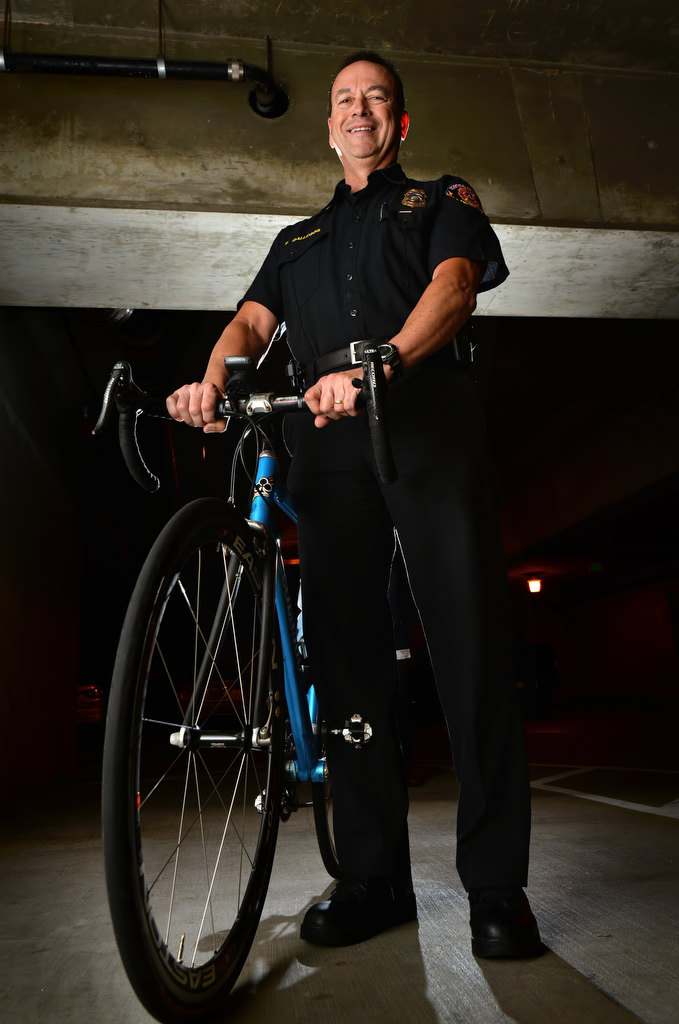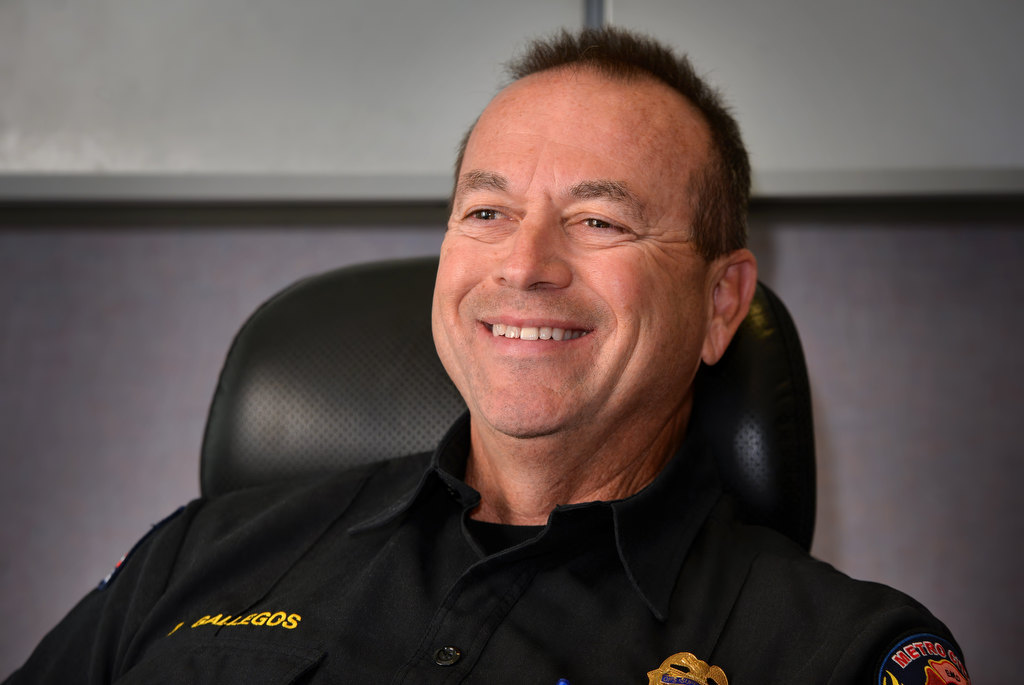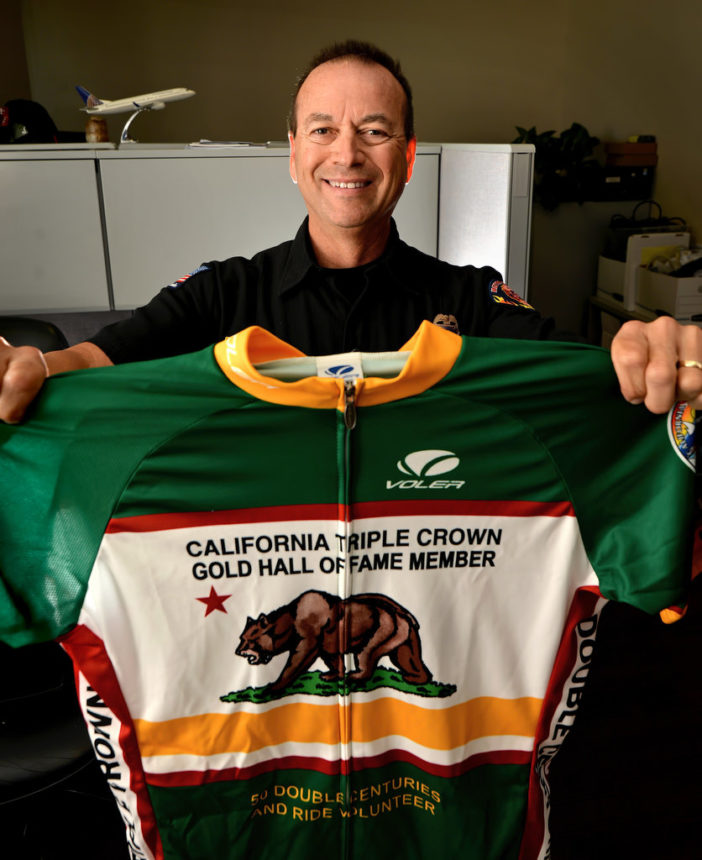Have you hugged your dispatcher today?
After all, it’s National Public Safety Telecommunicators Week (April 10-16), which honors telecommunications personnel in the public safety community.
But if you want to hug a certain Anaheim Fire & Rescue dispatch supervisor, good luck catching him — unless you happen to work in his office.
That’s because when he’s off the clock, Ed Gallegos usually is on his road bicycle, logging what for most people is an insane number of miles but what for him is routine.
Just last month, Gallegos, 55, became a California Triple Crown Gold Hall of Fame member.
Translation:
To earn membership in this elite club, a cyclist must complete 50 “doubles,” or 200-mile races, held throughout the state.
Gallegos, of Los Alamitos, hit the coveted 10,000-mile mark by completing the Solvang Double Century on March 19.
It took him 10 years to do it.
And for that, he got a much-coveted jersey.
“Only 162 people have this jersey,” says Gallegos, operations supervisor for Metro Cities Fire Authority and Metro Net Fire Dispatch.
“People actually come up to me and go, ‘Can I touch it?’”

Ed Gallegos with his $7,000, hand-signed Colnago road bicycle he calls “Blue Pony.”
Photo by Steven Georges/Behind the Badge OC
It’s not bluster.
In fact, Gallegos had to have his arm seriously twisted to sit down for an interview.
He’s not one for the spotlight.
It’s clear he has as much passion for the job of dispatching as he has for cycling (well, almost as much?).
“In many ways, dispatchers are the unknown responders,” says Gallegos, who manages and trains 30 fire emergency dispatchers for MetroNet, the eight-agency, joint-powers authority housed inside Anaheim Fire & Rescue headquarters.
Gallegos, who races in such fun-sounding events as the “OC Death Ride,” has been a dispatcher (or dispatch supervisor) with AF&R since 1996.
He has prior experience as a fire and police dispatcher elsewhere. He also worked as an ambulance driver and, while in high school, got paid $20 a night to sleep in private jets owned by local big-wigs that were stationed at Long Beach Airport. His job was to make sure people didn’t break into them and rip off the expensive radio equipment.
Gallegos doesn’t see a direct correlation working as a dispatcher and logging insane miles on his bike.
One thing is certain: Both pursuits take a special breed.
BLAME IT ON ENGLAND
Gallegos learned to love riding bikes as a young teen.
Although he was raised in Long Beach, he lived most summers of his formative years in England (his mother was born in St. Helens, a town outside Liverpool).
“I think what led me to long-distance bike riding was living in the U.K.,” Gallegos says. “They walk everywhere, and back then cars were a luxury due to gas — it was so expensive.
“I remember walking with my grandfather. We would leave at 8 a.m. to go to visit his sister and we wouldn’t get back home until 5 or 6 p.m. I have no idea how far it was. Heck, I was just a kid — I didn’t care. It was an adventure. I just assumed it was normal behavior.”

Ed Gallegos spent the summers of his youth in England, where his mother is from. The experience turned him into an avid road cyclist.
Photo by Steven Georges/Behind the Badge OC
What passes for “normal” behavior now for Gallegos is pursuing a bucket-list achievement 10 years in the making.
Sometime next year, or perhaps in 2018, he will complete riding to the four corners of the U.S. on his bike — covering, in several legs, a course from Vancouver to San Diego to the tip of Florida to Quoddy Lighthouse State Park in Maine (the farthest northeast point) and back to the West Coast.
For Gallegos, who rides anywhere from 150 to 300 miles a week while training for races (including commuting to and from work three days a week), bike riding is all about experiencing life to the fullest.
“If you go travelling in your car, you just see truck stops,” he says. “People in cars want the fastest route from point A to point B.
“On a bike, you’re in slow motion. You’re able to absorb the smells and see the animals and hear the noises and feel the wind on your face. People on motorcycles experience some of this, but on a bicycle it’s even better.”
Gallegos is just getting warmed up about his passion for the outdoors.
“I think the TV set is the worst invention ever,” he says. “It’s like an ATM for your life. You stick your ‘life card’ in it and it sucks away two to three hours of your life instantly.”
Gallegos currently has three bicycles. He names them all after horses, a nod to his summers in rural England.
His $7,000, hand-signed Colnago road bike is “Blue Pony.”
His Fixie is “P.J.,” for Pony Jr.
And he has a cross-country bike called “The Black Stallion.”
Asked whether he worries about cars while riding, Gallegos quips:
“I just push my hands on their fenders and push them aside.”
But true to his job as an AF&R dispatcher, Gallegos never rides without a helmet – and urges everyone, especially kids, to do the same.
A riding accident in December 2012 has slowed Gallegos down some and made it harder for him to climb hills.
But slowing down, for him, still means charging hard.
Gallegos plans to enter the Nomad in Utah (a solo 300-mile race) and also is eying the Silver State 508-miler in Nevada and, next year, the Voyager in Utah, a bun-burning 520-miler.
At the end of June, Gallegos — a married father of three grown children — will fly to Richmond, Va., to complete the leg to Maine.
“It’ll be 900 to 1,100 miles,” Gallegos says, “depending on my route.”
Adds Gallegos about his passion for cycling: “I don’t care how far it is, you tell me where to start and where the finish is, and I will get there.”
 Behind the Badge
Behind the Badge



